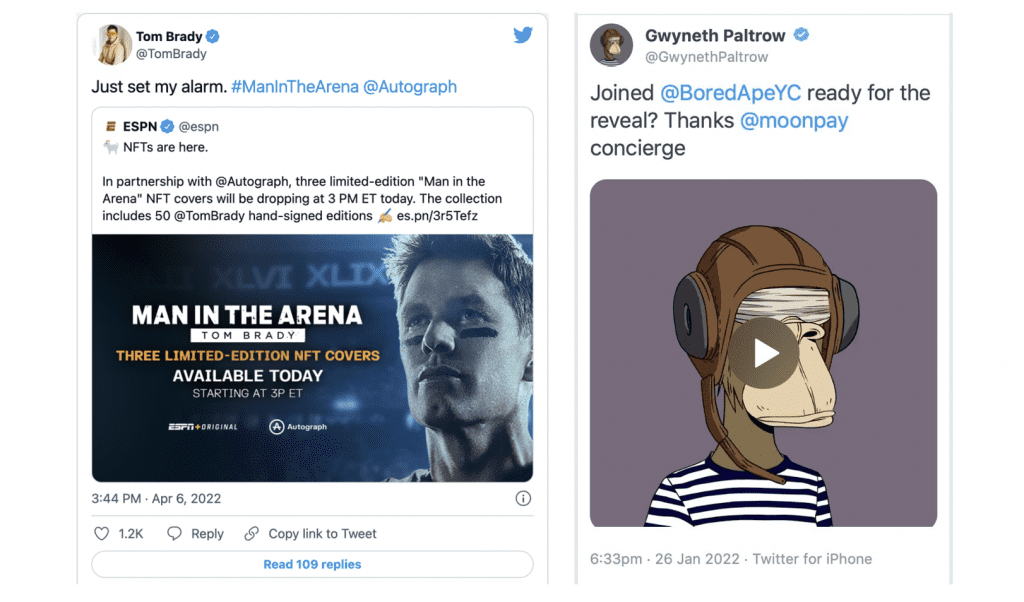An advertising watchdog is looking to crackdown on efforts by famous figures and influencers to endorse non-fungible token (“NFT”) projects that it suspects might be driven by the celebs collecting compensation in exchange for such promotions or maintaining stakes in the companies behind the projects – albeit without disclosing those connections to consumers. In a release on Monday, TINA.org revealed that it has sent letters to more than a dozen celebrities who it says have “promoted NFTs on their social media accounts,” informing them that if they have a material connection to the NFT companies – from Bored Ape Yacht Club to World of Women and Autograph – that they are promoting, those connections need to be clearly and conspicuously disclosed in their endorsements as required by law.
On the heels of sending letters to Justin Bieber and Reese Witherspoon earlier this year “regarding their undisclosed endorsements for two NFT companies, inBetweeners and World of Women, respectively,” Connecticut-based TINA.org claims that it recently sent letters to DJ Khaled, Drake Bell, Eminem, Eva Longoria, Floyd Mayweather, Gwyneth Paltrow, Jimmy Fallon, Logan Paul, Madonna, Meek Mill, Neymar, Paris Hilton, Shaquille O’Neal, Snoop Dogg, Timbaland, Tom Brady, and Von Miller, to alert them of the applicability of the Federal Trade Commission (“FTC”)’s rules regarding disclosures to the marketing of NFTs.
While NFTs still amount to relatively novel assets, TINA notes that “long-standing FTC law is clear” no matter the medium: “If an endorser has a material connection to a brand and/or company,” which it claims “can run the gamut from a six-figure endorsement deal to the gift of a free product or even a personal relationship [with someone at the company], then that material connection must be clearly and conspicuously disclosed because it can affect the weight or credibility that consumers give the endorsement.”
The bar is even higher for NFTs, according to TINA.org, which asserts that necessary disclosures go beyond those centering on “material connections” and extend to ones that inform consumers about “the risks associated with investing in these speculative products and the financial harm that can result from such investments.”

“While there is a lot of hype surrounding NFTs,” TINA.org states that it is “difficult to say how much of it is real and how much of it is manufactured,” and despite enduring media attention to the NFT space, these digital assets “are poorly understood, and the current market is subject to speculation and fraud.” And this is not helped, per TINA.org, by “celebrities, including, for example, popstar Justin Bieber, [who] are deceptively promoting NFTs on their social media channels.”
TINA.org’s latest batch of letters come roughly two months after the FTC announced that it is seeking commentary in connection with its plans to revise its online disclosure guide that is focused on digital advertising, potentially by way of new guidance that takes NFTs, the metaverse, and/or virtual reality into consideration. First released in 2000 and updated in 2013, the regulator’s “.com Disclosures Guide” aims to enable mobile and other online advertisers “to make disclosures clear and conspicuous to avoid deception.” The FTC recently revealed that it is seeking public comment on ways to modernize the guidance to align it with new advances in technology and how advertisers now interact with consumers.
While the FTC highlights its desire to crack down on advertisers’ attempts to “avoid liability under the FTC Act by burying disclosures behind hyperlinks,” along with the rising use of “dark patterns” (i.e., technology crafted to trick users into taking certain actions online that they might not otherwise take) and “other forms of digital deception,” the regulator is also specifically seeking comment on “advertising embedded in games and virtual reality, and microtargeted advertisements.”
As we noted in June, regardless of whether the FTC opts to present guidance specific to NFTs and/or the metaverse if/when it makes changes to the .com Disclosures Guide, its existing rules regarding advertising disclosures do, in fact, apply to advertising and endorsements in web3 just as they to do to more traditional forms of advertising and endorsements. Among other things, the FTC “has made clear that its disclosure requirements will continue to apply to virtual influencers that appear to be endorsers of a brand’s products or services, even if such endorsers are not real people,” Davis & Gilbert lawyers state in a recent note.
The FTC’s existing rules also undoubtedly apply to the wave of celebrities that have been busy promoting NFTs over the past year – even if the tech at play is relatively new.
The letters also follow from a complaint that TINA.org filed with the FTC, urging the government regulator to take action over Roblox, the wildly popular metaverse/gaming platform. In a complaint lodged with the FTC in April, TINA.org alleged that Roblox, “a multibillion-dollar public company,” is on the hook for failing to “establish any meaningful guardrails to ensure compliance with truth in advertising laws, effectively allowing marketers, including but not limited to Alo Yoga, DC Entertainment, Forever 21, Hasbro, Hyundai Motor America, Mattel, Netflix, NFL Enterprises LLC, Nike, Paramount, and VF Corp., to manipulate millions of consumers in one of the largest and most captivating virtual platforms on the internet today.”











